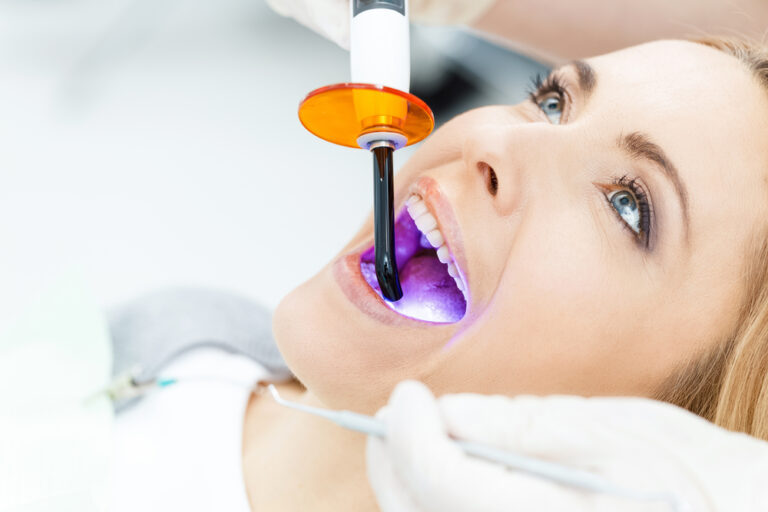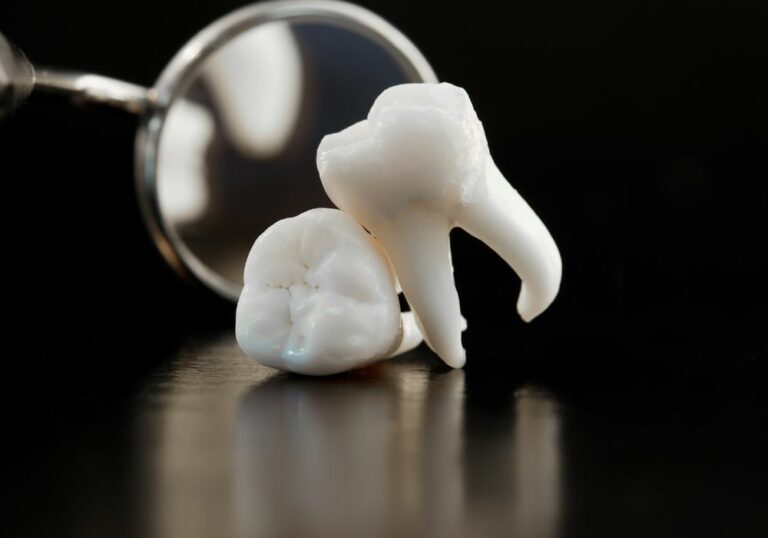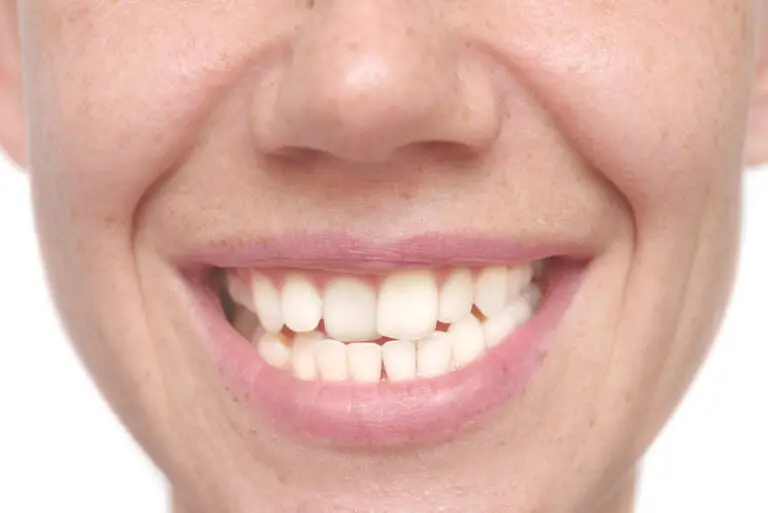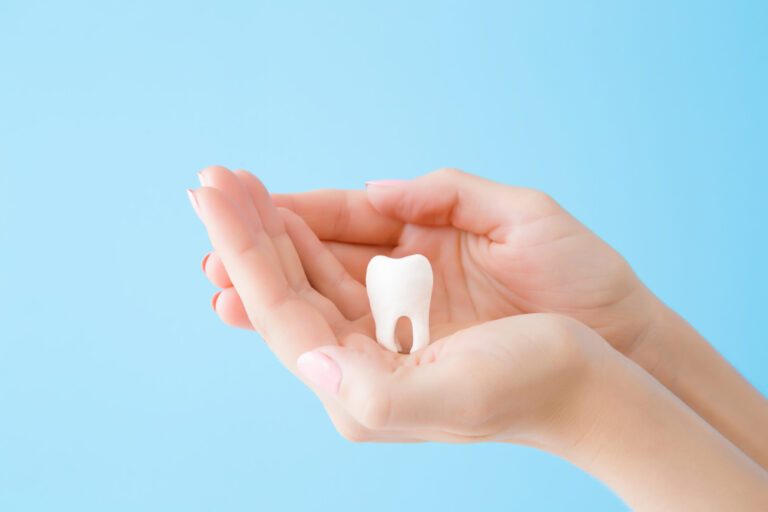Have you noticed a sudden shift in your jaw alignment? It could be due to your wisdom teeth. Wisdom teeth, also known as third molars, are the last set of teeth to develop and usually emerge between the ages of 17 and 25. While some people have enough room in their jaw to accommodate these teeth, others may experience complications such as impaction or shifting.
If your wisdom teeth are impacted, meaning they are unable to emerge properly, they can push against neighboring teeth and cause them to shift. This can lead to misalignment of your bite and jaw, resulting in discomfort and difficulty with chewing and speaking. Additionally, impacted wisdom teeth can also cause swelling, pain, and infection.
Understanding Wisdom Teeth
Wisdom teeth are the third molars that typically emerge between the ages of 17 and 25. They are the last teeth to come in and are located at the back of your mouth. Most people have four wisdom teeth, but some may have fewer or none at all.
Wisdom teeth can cause a variety of problems, including pain, infection, and damage to surrounding teeth. In some cases, they may even cause your jaw to shift.
The reason wisdom teeth can cause your jaw to shift is that they put pressure on the other teeth as they grow in. This pressure can cause the teeth to shift, leading to misalignment and other problems.
It’s important to note that not everyone will experience problems with their wisdom teeth. Some people may have enough room in their mouths for the teeth to grow in without causing any issues. However, if you do experience pain or discomfort, it’s important to see a dentist or oral surgeon to determine the best course of action.
Overall, understanding wisdom teeth and their potential impact on your jaw is important for maintaining good oral health. If you have concerns about your wisdom teeth, don’t hesitate to speak with a dental professional.
Jaw Structure and Wisdom Teeth

Wisdom teeth, also known as third molars, are the last set of teeth to develop in your mouth. They typically emerge between the ages of 17 and 25, and in some cases, they may not emerge at all.
One common myth is that wisdom teeth can cause your jawline to shift. While it is true that wisdom teeth can have an impact on the structure of your jaw, it is unlikely that they will cause a significant shift in your jawline.
However, if your wisdom teeth do not have enough room to emerge properly, they may become impacted, which can cause pain, infection, and other dental problems. If you experience any of these symptoms, you should see a dentist or oral surgeon as soon as possible.
It is important to note that not everyone needs to have their wisdom teeth removed. Your dentist or oral surgeon will evaluate your individual situation and determine whether or not wisdom tooth extraction is necessary.
Here are some common questions and answers about wisdom teeth and jaw structure:
| Question | Answer |
|---|---|
| Can wisdom teeth cause shifting of other teeth? | Wisdom teeth can exert some pressure on adjacent teeth as they try to erupt, but this pressure is rarely significant enough to cause noticeable shifting of other teeth. |
| Will removing wisdom teeth affect the structure of my jaw? | Removing wisdom teeth will not affect the overall structure of your jaw. However, if your wisdom teeth were impacted, removing them may help to alleviate pain and prevent further dental problems. |
| Can wisdom teeth cause facial asymmetry? | Wisdom teeth can potentially affect facial symmetry if they cause significant pressure on the surrounding teeth and jawbone. However, this is rare and usually only occurs in extreme cases. |
In summary, while wisdom teeth can have an impact on the structure of your jaw, they are unlikely to cause a significant shift in your jawline. If you experience any dental problems related to your wisdom teeth, it is important to see a dentist or oral surgeon as soon as possible to determine the best course of treatment.
Impact of Wisdom Teeth on Jaw Alignment
If you still have your wisdom teeth, you may have wondered if they can shift your jaw alignment. While wisdom teeth themselves do not directly cause a shift in jaw alignment, they can indirectly influence it. In this section, we’ll take a look at some of the ways impacted wisdom teeth can impact your jaw alignment.
Physical Shift
When wisdom teeth grow in, they can push against neighboring teeth, causing them to shift. This can lead to crowding and misalignment of the teeth. As a result, your bite may change, and your jaw may shift to compensate for the new tooth position. This can cause discomfort and pain, as well as affect the appearance of your smile.
Pain and Discomfort
Impacted wisdom teeth can cause pain and discomfort in the jaw and surrounding areas. This pain can be caused by pressure from the tooth pushing against surrounding teeth or by infection in the gum tissue around the tooth. If left untreated, this pain can worsen and lead to more serious dental problems.
Changes in Bite
If your wisdom teeth are causing your other teeth to shift, this can also impact your bite. When your bite changes, it can put pressure on your jaw joint, causing pain and discomfort. Additionally, changes in your bite can lead to problems with chewing and speaking.
In summary, while wisdom teeth themselves do not directly cause a shift in jaw alignment, they can indirectly influence it. Impacted wisdom teeth can cause physical shifts, pain and discomfort, and changes in your bite. If you’re experiencing any of these symptoms, it’s important to speak with your dentist about treatment options.
The Role of Wisdom Teeth Extraction

If you are experiencing discomfort or pain in your jaw, it could be due to wisdom teeth. Wisdom teeth are the last set of molars that grow in the back of your mouth, and they can cause a variety of dental problems. One of the most common issues is that they can shift your jaw, leading to pain and discomfort. In this section, we will discuss the role of wisdom teeth extraction in preventing and treating jaw shifting.
Preventive Measures
The best way to prevent wisdom teeth from shifting your jaw is to have them removed before they cause any problems. Your dentist may recommend wisdom teeth extraction if they see signs that your teeth are impacted or if they are growing in at an angle. Removing wisdom teeth before they cause any issues can prevent jaw shifting and other dental problems.
If you are concerned about the cost of wisdom teeth extraction, talk to your dentist about your options. Many dental insurance plans cover the cost of wisdom teeth extraction, and some dentists offer payment plans to make the procedure more affordable.
Post Extraction Changes
After wisdom teeth extraction, you may experience some changes in your mouth. Your other teeth may shift slightly as they adjust to the space left by the extracted teeth. However, this is a normal part of the healing process and should not cause any significant issues.
To prevent further shifting, your dentist may recommend that you wear a retainer after your wisdom teeth extraction. This will help to keep your teeth in their proper position and prevent any further shifting of your jaw.
In conclusion, wisdom teeth extraction can play a crucial role in preventing and treating jaw shifting. If you are experiencing discomfort or pain in your jaw, talk to your dentist about the possibility of wisdom teeth extraction. By taking preventive measures and following post-extraction instructions, you can ensure that your teeth and jaw remain healthy and pain-free.
Expert Opinions and Studies
According to the Mayo Clinic, impacted wisdom teeth can cause jaw pain, swelling, and difficulty opening your mouth. When wisdom teeth do not have enough room to emerge or grow normally, they may push against other teeth, causing them to shift. This can lead to bite problems, such as an overbite or underbite, and may cause discomfort when biting or chewing.
Medical News Today reports that wisdom teeth can also affect the temporomandibular joint (TMJ), which connects the lower jaw bone to the temporal bones on either side of the head. When wisdom teeth push against other teeth, they can put pressure on the TMJ, causing pain or discomfort. In some cases, removing wisdom teeth can help alleviate TMJ symptoms.
A study published in the Journal of Oral and Maxillofacial Surgery found that wisdom teeth can cause significant changes in jaw position and bite force. The study followed a group of patients who had their wisdom teeth extracted and found that their bite force decreased by 30% after the procedure. The study suggests that wisdom teeth can have a significant impact on jaw position and function.
Another study published in the Journal of Dental Research found that wisdom teeth can cause changes in the position of adjacent teeth. The study followed a group of patients who had their wisdom teeth extracted and found that their other teeth shifted over time. The study suggests that wisdom teeth can cause long-term changes in dental alignment.
Overall, expert opinions and studies suggest that wisdom teeth can shift your jaw and cause bite problems, discomfort, and changes in dental alignment. If you are experiencing symptoms associated with impacted wisdom teeth, it is important to consult with a dental professional to determine the best course of treatment.
Myths and Misconceptions

When it comes to wisdom teeth and jaw alignment, there are many myths and misconceptions that can cause confusion. Let’s take a closer look at some of the most common ones:
- Myth #1: Wisdom teeth always cause jaw misalignment. While it’s true that wisdom teeth can cause problems with jaw alignment in some cases, it’s not always the case. In fact, many people have their wisdom teeth removed without any issues with their jawline.
- Myth #2: Removing wisdom teeth will always fix jaw alignment issues. While removing wisdom teeth can sometimes help to improve jaw alignment, it’s not a guaranteed solution. Other factors, such as genetics and pre-existing conditions, can also play a role in jaw misalignment.
- Myth #3: Everyone needs to have their wisdom teeth removed. This is simply not true. While some people may experience problems with their wisdom teeth, others may never have any issues. It’s important to consult with your dentist or oral surgeon to determine whether or not your wisdom teeth need to be removed.
- Myth #4: Wisdom teeth always cause pain and discomfort. While it’s true that impacted wisdom teeth can cause pain and discomfort, not all wisdom teeth cause problems. In fact, some people may not even realize that their wisdom teeth are coming in until they visit their dentist.
By understanding these common myths and misconceptions, you can make more informed decisions about your oral health. Remember to always consult with your dentist or oral surgeon if you have any concerns about your wisdom teeth or jaw alignment.
Managing Shifts in Jaw Alignment
If you are experiencing shifts in jaw alignment due to wisdom teeth, there are several steps you can take to manage the issue.
First, it is important to seek the advice of a dental professional. They can assess the alignment of your jaw and determine the best course of action. In some cases, they may recommend orthodontic treatment or jaw surgery to correct the issue.
In addition to professional treatment, there are several things you can do at home to manage shifts in jaw alignment. These include:
- Practicing good oral hygiene to prevent infection and inflammation that can exacerbate the issue.
- Avoiding hard or chewy foods that can put additional strain on the jaw.
- Using ice packs or warm compresses to alleviate pain and swelling.
- Performing jaw exercises to help strengthen the muscles and improve alignment.
- Using over-the-counter pain relievers as directed to manage discomfort.
It is important to note that while these measures can help manage shifts in jaw alignment, they may not be enough to fully correct the issue. It is always best to seek the advice of a dental professional to determine the most effective treatment plan for your specific situation.
Frequently Asked Questions
Can wisdom teeth extraction cause shifting of other teeth?
Yes, wisdom teeth extraction can cause shifting of other teeth. When wisdom teeth are removed, it creates a space in your mouth which can cause other teeth to shift and move to fill the gap. This can lead to crooked teeth, overcrowding, and changes in your bite.
Is it normal for teeth to shift after wisdom teeth removal?
Yes, it is normal for teeth to shift after wisdom teeth removal. This is because the removal of wisdom teeth can cause changes in the alignment of your teeth and jaw, which can lead to shifting of other teeth.
Can wisdom teeth removal affect your bite?
Yes, wisdom teeth removal can affect your bite. When wisdom teeth are removed, it can cause changes in the alignment of your teeth and jaw, which can lead to changes in your bite. This can cause discomfort, difficulty chewing, and other dental problems.
How long after wisdom teeth extraction do teeth start to shift?
Teeth can start to shift immediately after wisdom teeth extraction, but it can take several months for the full effects of the extraction to become apparent. It is important to follow your dentist’s instructions for post-operative care to minimize the risk of shifting and other complications.
What can be done to prevent teeth from shifting after extraction?
To prevent teeth from shifting after extraction, it is important to maintain good oral hygiene, including regular brushing and flossing. Your dentist may also recommend the use of a retainer or other orthodontic appliance to help keep your teeth in place.
Can wisdom teeth removal change the shape of your jaw?
Wisdom teeth removal is unlikely to change the shape of your jaw. However, it can cause changes in the alignment of your teeth and jaw, which can lead to changes in your bite and other dental problems. If you are concerned about changes to the shape of your jaw, it is important to speak to your dentist or orthodontist.






